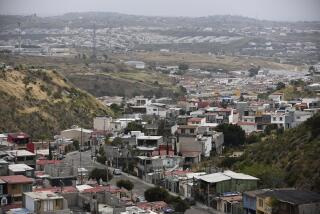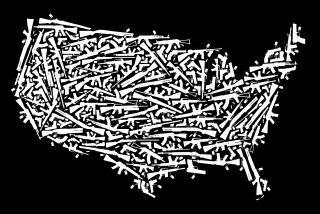U.S. Links Gun Deal to Group That Attempted Trinidad Coup
- Share via
MIAMI — To all but a small circle of federal agents, the sting operation seemed routine at first.
After more than a year of negotiations, undercover agent Steve McKean, working for the U.S. Bureau of Alcohol, Tobacco and Firearms, led his target to a nondescript warehouse in Fort Lauderdale, Fla., where McKean produced the wares:
Sixty AK-47 assault rifles and 10 submachine guns equipped with silencers--enough weaponry to stage a small coup in a small enough land.
But more chilling than the arrest of McKean’s Trinidad-born customer, Keith Andre Glaude, two weeks ago on federal gun charges was Glaude’s declaration of whom he was working for. According to McKean’s sworn affidavit, Glaude told federal investigators that he was sent by Jamaat al Muslimeen, a Black Muslim group that ranks among the most militant Islamic forces in the Americas.
Glaude, who pleaded not guilty in federal court last week, reportedly identified his contact in Trinidad and Tobago as Lance “Fire” Small of Jamaat al Muslimeen. In his affidavit, McKean also said he and an informant had been negotiating directly with Small all along.
Jamaat has a track record. In July 1990, the group seized Trinidad and Tobago’s Parliament at gunpoint, took the prime minister, legislators and journalists hostage and blew up police headquarters with a car bomb during a six-day siege. The accompanying revolt and rioting left more than 30 people dead.
An ATF investigation after the siege found that many of the guns Jamaat used were purchased in Fort Lauderdale’s Broward County, according to the bureau’s regional spokesman, Ed Halley.
During the same months that McKean was negotiating the arms sale this year, Trinidad and Tobago’s prime minister, Basdeo Panday, was warning his oil- and gas-rich nation of 1.3 million people that another such plot was afoot, making clear he was talking about Jamaat without naming the group.
Group Denies Link to Arrested Man
In the days since Glaude’s arrest, Jamaat has disowned both him and the gun sale. The group’s security chief, Hasan Anyabwile, told reporters in Trinidad and Tobago’s capital, Port of Spain, “If he is claiming he went for the guns on our behalf, that was a purely maverick and unsolicited action on his part.”
Jamaat’s leader, Yasin abu Bakr, a former police officer who launched the 1990 coup attempt with more than 100 men, told a local radio station that there was no connection between his group and Glaude.
Abu Bakr, who has found limited appeal through the years in a population divided equally between ethnic East Indians and mostly Christian blacks, was initially jailed with his men and sentenced to death for the coup attempt. The conviction was overturned on appeal in 1992, and the entire group has been free since.
Small also was quoted by reporters in Trinidad as saying he had no ties to Glaude or the guns, although he and Jamaat acknowledged that Small is a Jamaat member who took part in the siege 11 years ago.
Nation’s Officials Worry New Plots Are Afoot
But agent McKean’s affidavit casts Glaude as a courier for Small and Jamaat. The document indicates that the ATF assumed from the start of the investigation, in February 2000, that the guns were destined for Jamaat. McKean “taped numerous phone conversations” between himself and Small from April 2000 until last March, according to his affidavit.
McKean also stated that after Glaude took possession of the small arsenal, Glaude called Small on his cellular phone to confirm that the delivery had been made.
ATF officials here declined to comment further on whether Small also will be indicted, but spokesman Halley said the investigation is continuing.
Trinidad and Tobago’s attorney general, Ramesh Maharaj, said the U.S. has filed no extradition request for Small but that he would pursue it if one was made. Trinidad and Tobago has extradited more suspected felons to the U.S. than any other Caribbean country in recent years.
Maharaj has voiced deep concern in recent months about illegal arms shipments, coup plots and other discoveries.
Two months ago, customs agents in Trinidad and Tobago seized two armor-plated sport-utility vehicles that had been outfitted with mounts for machine guns and missile launchers. The vehicles had been shipped from the U.S.
Armored Vehicles ‘Were Equipped to Fight Wars’
A sales agreement obtained by The Times shows the vehicles were purchased last year for $300,000 by two Trinidadian American brothers who later said they planned to resell them in the island nation. (The brothers have sued to recover the 1998 Lincoln Navigators.)
Maharaj declined to point fingers during an interview in Port of Spain last month. He said only: “These vehicles were equipped to fight wars. . . . How many other such vehicles have left for the Caribbean? We’re still looking for the answers.”
More to Read
Sign up for Essential California
The most important California stories and recommendations in your inbox every morning.
You may occasionally receive promotional content from the Los Angeles Times.













